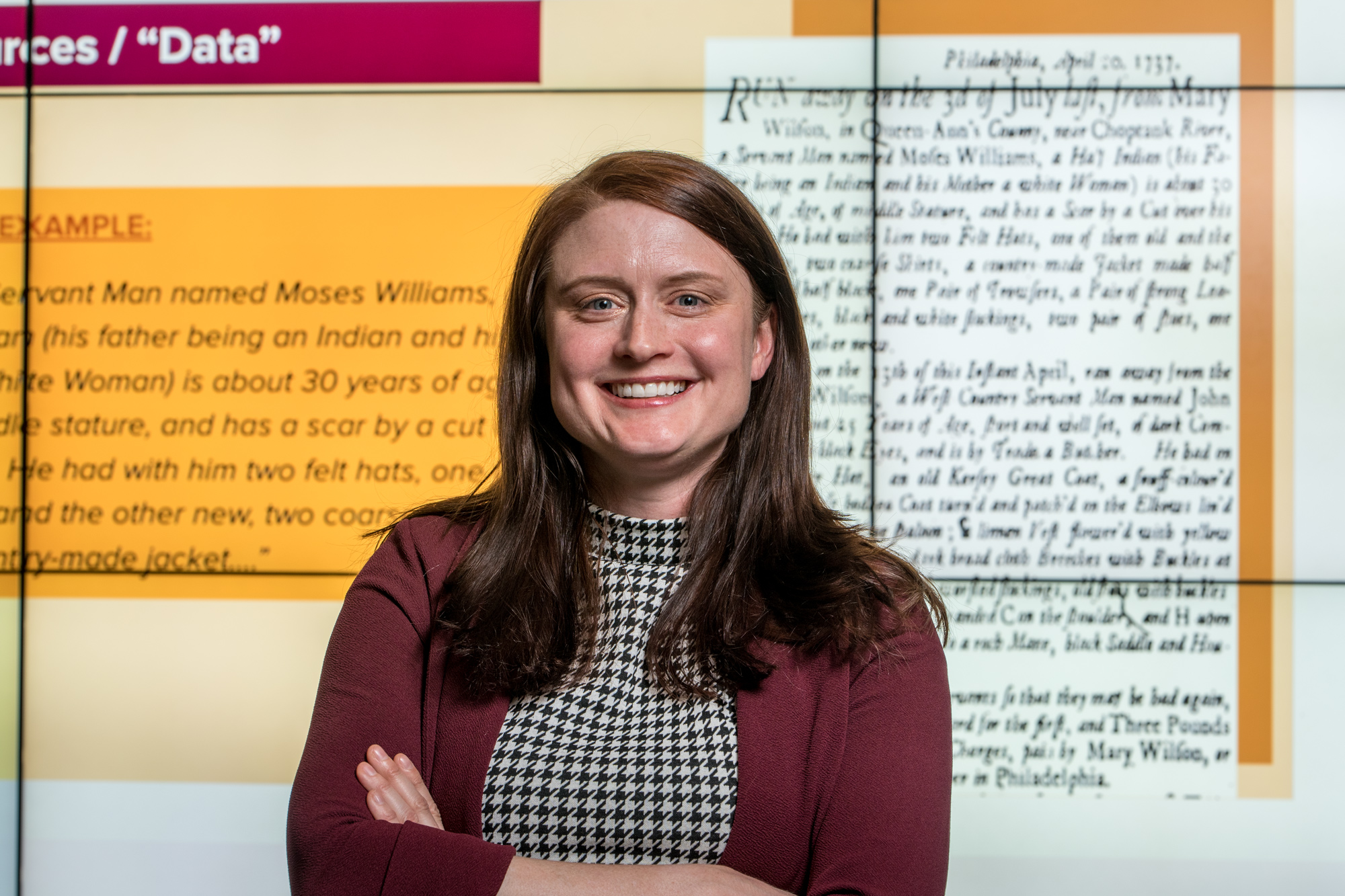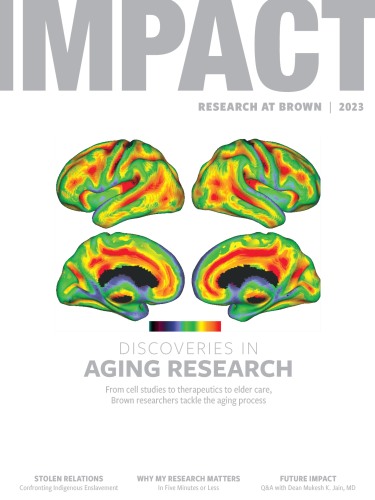Stolen Relations: Confronting Indigenous Enslavement, One Story at a Time
An ever-expanding initiative of Brown scholars, young volunteers, and Native American leaders, the online repository Stolen Relations has recovered thousands of records of Indigenous enslavement in the Americas, drawing increased attention to a topic rarely broached in school history lessons.
An ever-expanding initiative of Brown scholars, young volunteers, and Native American leaders, the online repository Stolen Relations has recovered thousands of records of Indigenous enslavement in the Americas, drawing increased attention to a topic rarely broached in school history lessons.
About 350 years ago, amid a conflict known as King Philip’s War, the English captured and enslaved a group of Wampanoag Native Americans.
The Wampanoags were shipped by boat to Tangier, once an English colony and now a major Moroccan city. When they arrived, they wrote in a panic to Massachusetts colony pastor and missionary John Eliot, whom they considered an ally.
According to Linford Fisher, associate professor of history, “They essentially wrote, ‘We were enslaved during the war, we’re serving in Tangier, and our simple request is just to be returned to our homeland.’ As far as I can tell, they were never able to leave. They never saw their families again, and nothing was ever done.”
Their story, Fisher said, is one of the countless heartbreaking tales of Indigenous enslavement that historians have only just begun to unearth in the past few decades. In 2015, to advance collaboration in the nascent effort, Fisher created Stolen Relations: Recovering Stories of Indigenous Enslavement in the Americas, an online repository that contains more than 5,500—and counting—records of Indigenous enslavement.
Created with his scholarly peers in mind, the project aims to become an empowering tool for Indigenous communities and descendants of European colonizers who wish to confront their full, painful ancestral histories. It also intends to raise widespread awareness of Indigenous enslavement, which has long been omitted, glossed over, or mentioned only obliquely in U.S. classrooms.
“As the field kept on growing, and as I talked more and more with colleagues who were researching the same thing, I kept thinking that there should be some sort of centralized resource where we can all benefit from each other’s work,” Fisher said. “I hope the project will ultimately become a resource that is not only beneficial to researchers and educators but also to public historians, genealogists, and tribal nations.”
Broadening the Mission
Eight years after its start, Stolen Relations is set to continue expanding thanks to a $350,000 grant from the National Endowment for the Humanities. The majority of the grant will fund a redesigned, publicly accessible site for the online repository, which is currently available only to registered users, most of them scholars and community partners. According to Ashley Champagne, director of Brown’s Center for Digital Scholarship and the longtime project manager of the Stolen Relations repository, the website’s records will not only continue to grow but also be enriched by the important cultural context provided by regional Indigenous leaders.
“Most people know so little about Indigenous enslavement, but creating a public portal to more than 5,500 records could change that,” Champagne said. “Over time, we hope to offer maps, timelines, and multimedia that help people understand how Indigenous enslavement shaped economies and people in the Americas and scattered Indigenous communities around the world.”
The funds will also allow Fisher to hire graduate fellows, who over three years will help sort through and organize archives at Rhode Island’s Tomaquag Museum. The museum’s archives contain critically important records of Indigenous life in southern New England, and many could shed light on yet more instances of Indigenous enslavement. Drawing from the archives, the fellows and the museum will ultimately collaborate on an exhibition about settler colonialism and Indigenous enslavement in the region. The exhibition will be on view at the museum and later travel to Brown.
Lorén Spears, director of the Tomaquag Museum, said the partnership would expand public access to the museum’s estimated 100,000 records, offering broader insights on local Indigenous life. It will also add a needed dimension to Stolen Relations, humanizing its enslaved subjects and emphasizing Indigenous peoples’ resilience.
“We want to not only uncover and recover those stories of enslavement but also understand how our people adapted to the difficulties they faced and persisted into the 21st century,” Spears said. “Some Native people in this area were sent to Bermuda to work on sugar cane plantations. Their descendants are now reconnecting with relatives in New England and sharing how they kept and adapted cultural traditions. It’s important to know that their ancestors were enslaved, yes, but it’s equally important to celebrate their resilience and the reconnection that is happening.”
“ We want to not only uncover and recover those stories of enslavement but also understand how our people adapted to the difficulties they faced and persisted into the 21st century. ”
The grant funds will also allow Stolen Relations to deepen its already-close partnerships with tribal communities in Rhode Island, Massachusetts, Connecticut, and beyond, Fisher said. Three years of funds for a summer tribal internship will allow Fisher to work with and learn from young tribal members as he and his team continue to build and expand the online repository. The grant will also support regular meetings with local tribal leaders, who have provided crucial insights that have transformed Stolen Relations.
“I think one of the biggest positive outcomes of this project is that it not only directs people to the past to learn about this important history, but it also increases their awareness of Indigenous peoples today,” Fisher said. “Tribal leaders have left their stamp all over this project, which I think leads people to come away saying, ‘Wow, these people are still here; even after all they’ve suffered, they’ve persisted with incredible resilience.’”
Long-Forgotten History
Across the Americas, between 1492 and 1900, an estimated 2 million to 5.5 million Indigenous people were summarily taken from their ancestral homelands and forced into slavery. Some were made to work on farms and estates on the lands they once used freely, while others were sent to European cities and colonial outposts in Africa and Asia.
Fisher said that despite the phenomenon’s huge scale, most students in the U.S. never learned about Indigenous enslavement in school. That’s partly because European colonists didn’t keep meticulous records of the Indigenous people they enslaved.
“It’s not like the transatlantic slave trade, where we have very clear shipping records and plantation records where slaves were tabulated,” Fisher said. “Indigenous slavery operated in this semilegal realm and wasn’t always called slavery. As a result, the documentation is much sparser, and it takes more work to turn up these stories.”

Fisher believes the subject didn’t enter the national consciousness until 2003 when two books on Indigenous enslavement won the Bancroft Prize, which is considered one of the highest honors for American historians. Those books inspired a proliferation of scholarship on the topic, and in the last 20 years, facts about European colonists’ past enslavement of Indigenous people in Brazil, the Dominican Republic, and other parts of the Caribbean and Spanish Americas have emerged.
The topic gained even more momentum after 2016 when the book The Other Slavery: The Uncovered Story of Indian Enslavement in America was shortlisted for the Booker Prize. By the time the Black Lives Matter movement renewed public focus on widespread systemic racism in 2020, some K–12 teachers had already begun introducing the subject of Indigenous slavery to their students, alongside lessons on the transatlantic slave trade.
“I’ve had a few opportunities to participate in workshops for local high school teachers, and whenever I present, teachers always say, ‘This is crazy; I had no idea that it was happening here and it wasn’t just the Spanish [enslaving Native Americans],’” Fisher said. “They’ll say, ‘How can I incorporate this into my classroom lessons?’”
Fisher’s research on Indigenous enslavement began in 2011; he traveled to the United Kingdom, the Caribbean, and other sites where Indigenous peoples had been enslaved. After several years in the field, he wished to collaborate with scholars exploring the subject in Latin America, Brazil, and other parts of the world.
So, in 2015, he worked with the Center for Digital Scholarship to create the Stolen Relations website. This repository now contains historical records of Indigenous slavery found in journals, property documents, newspapers, books, and manuscripts. Stolen Relations shares decades of research, fieldwork, and ancestral knowledge from approximately 60 contributors at Brown and across the globe. Some are records of the enslaved, others of enslavers. Some contain extremely detailed personal accounts, while others are brief: a name, maybe an age.
Each record offers but one anecdote—but together, Fisher said, they are an unsettling reminder of the systemic violence and subjugation Europeans employed to build their empires.
“This is not just an add-on to the story of colonization,” Fisher said. “This is fundamental to how the English succeeded in colonizing the continent. You don’t have vast areas of New England, the Mid-Atlantic, or the South ‘available’ for settlements if you haven’t destabilized the existing Indigenous communities and tribes over time through kidnapping and enslavement.”
A Community-Wide Project
This isn’t the first time Stolen Relations has shifted direction in a beneficial way. Fisher said that a few years after the repository’s original launch, he and his colleagues realized it was missing something: a perspective from Indigenous peoples.
“We became convinced that this should be a collaborative project with tribes and Indigenous communities,” Fisher said. “That was a big pivot for us. It ceased to be simply an academic project serving the academic community.”
In the fall of 2019, Fisher reached out to 15 regional tribes and communities to propose forming a Tribal Community Collaborators board for the project. Joining in this effort were Rae Gould, executive director of Brown's Native American and Indigenous Studies Initiative, and former Brown librarian Lydia Curliss, both members of the Nipmuc Nation. Since then, Indigenous leaders across southern New England, including Spears, have met with Fisher, Gould, and others at Brown twice a year to discuss the ongoing research and its online home.
“ I think this younger generation sees historical injustices very clearly, and they feel so compelled to set things right that they make time to do that work outside of school. ”
Their meetings transformed the project, starting with its name. Originally called the Database of Indigenous Slavery in the Americas, the team renamed the website Stolen Relations after seeing firsthand how personal and painful its stories were to tribal leaders. Fisher recalled a moment when a Shinnecock leader, after learning that some of her ancestors had been enslaved, paused the meeting to offer a verbal apology to her forebears for the trials they’d endured.
“To academic researchers, slavery is largely about labor and economics,” Fisher said. “We make these nitpicky distinctions between slavery and servitude based on how people ended up in the position they were in. But watching Mohegan, Narragansett, and Nipmuc leaders look at these documents for the first time and process the information they found really chastened me. Their attitude is, who cares whether it’s slavery or servitude? Who cares whether someone was kidnapped or whether they surrendered to the English to protect their family from harm? The result is the same: people were stolen from our communities.”
The tribal board also counseled Fisher to focus on collecting records of the enslavers and the enslaved; doing so could bolster the work of Native genealogists since many Indigenous people were assigned their enslavers’ surnames. The board also inspired Fisher and Champagne to add important contextual notes to the historical records. The website’s new notices about the documents’ harmful terminology and possible inaccuracies, Champagne said, help humanize Indigenous people and allow the archive to balance compassion and historical accuracy.
Fisher received the 2023 Howard R. Swearer Engaged Faculty Award for Research for his work on Stolen Relations and its partnership with the Tomaquag Museum.
Since the start of this project in 2015, he has developed an increasingly collaborative approach that Gould deems “a model for how Brown can do important engaged scholarship with tribal communities.” Tribal representatives—appointed by tribal leadership—are involved in critical aspects of the project and paid for their time and expertise. Tribal interns have been engaged as research assistants, and Indigenous elders and youth from Native nations in the region have participated in summer institutes. Gould appreciates how these activities “help to build bridges and connections with local tribal peoples in positive and powerful ways.”

The project’s collaborators extend beyond Indigenous tribes and nations. Fisher hopes to work with Brown’s Choices Program to develop a nationwide K–12 curriculum on Indigenous enslavement for teachers. And for several years now, Fisher has maintained a roster of 12 to 15 high school interns, in addition to Brown student research assistants, who help digitize, organize, and update records in the ever-growing repository. Each of those students reached out to Fisher unprompted, a testament to Stolen Relations’ broad and ever-growing impact.
“They are so smart and so hardworking; it’s astonishing,” Fisher said. “I think this younger generation sees historical injustices very clearly, and they feel so compelled to set things right that they make time to do that work outside of school. That’s so encouraging to me because I’m the same way. I teach, and I write books, and I hope those make an impact. But this collaborative project has been incredibly meaningful to me, and I hope that it is part of creating a public good that will far outlast those of us who were fortunate enough to participate in its development.”
Spears considers the project “extremely important, as it recovers a hidden history that, if properly interpreted, can go a long way to help a wider public understand the important role Indigenous enslavement played in settler colonialism as well as the ongoing historical trauma it imposed on our communities.
